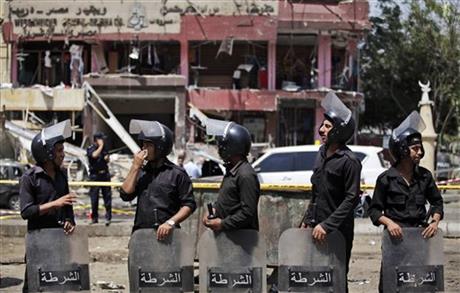
By HAMZA HENDAWI
Egyptian security officers guard the scene of a bomb attack targeting the convoy of Egypt’s Interior Minister Mohammed Ibrahim, in Nasr City, Cairo, Egypt, Thursday, Sept. 5, 2013. A “large” explosive targeted the convoy of Egypt’s interior minister Thursday in Cairo’s eastern Nasr City district, the first attack on a senior government official since a coup toppled the country’s Islamist president July 3, 2013. (AP Photo/Khalil Hamra)
CAIRO (AP) — A bomb targeted the convoy of Egypt’s interior minister Thursday in Cairo in the first attack on a senior government official since the country’s Islamist president was toppled in a coup two months ago, raising concerns over a possible campaign of violence by his supporters.
The assassination attempt against Mohammed Ibrahim, who is in charge of the police force, signaled the arrival in the capital of the sort of insurgency-style attacks that have been escalating in the Sinai Peninsula.
Sinai has been roiled in unrest and lawlessness for years, but Islamic militants have carried out more frequent and deadlier attacks on security forces there since the July 3 ouster of President Mohammed Morsi.
The bombing also harkened back to the insurgency waged by Islamic militants in the 1980s and 1990s against the rule of now-ousted autocrat Hosni Mubarak. At that time, militants targeted several senior officials, killing the parliament speaker and nearly killing the then-interior minister. Mubarak himself survived an assassination attempt in 1994, when militants attacked his convoy in Addis Ababa, Ethiopia.
Some of Morsi’s more hard-line supporters have publicly threatened to wage a campaign of assassinations and car bombings against officials of the military-backed government until the former president is reinstated.
There was no immediate claim of responsibility for Thursday’s blast, which went off in the late morning as Ibrahim’s convoy passed through Nasr City, an eastern district of Cairo. The ministry did not immediately say where the bomb was planted.
Ibrahim survived the attack, but at least 22 people were wounded, including two policemen and a child seriously. There were no fatalities.
Clearly shaken but unscathed, Ibrahim said on state television that his car, a black SUV, was directly hit by a “large-size explosive device” that badly damaged it along with four other vehicles in the convoy.
“It was a heinous (assassination) attempt,” he later told reporters at the Interior Ministry in central Cairo. The explosive device, he added, likely was detonated by remote control. His comments were carried live on state television.
“Even if I am martyred, another minister of interior will come and continue the war on the evil terror until we secure the country,” Ibrahim said.
The blast damaged stores and several cars parked on the street and shattered the windows of several nearby apartment buildings. The aftermath of the blast suggested a powerful explosion, with three badly damaged SUVs, including the minister’s, and a small raging fire. The blast site was littered with debris, including tree branches severed by the explosion.
Police were searching for suspects in the area but no arrests had been made, security officials said. They spoke on condition of anonymity because they were not authorized to speak to the media.
Gamaa Islamiya, the radical Islamist group behind the 1980s and 1990s insurgency, said it had nothing to do with the attack, which it condemned. Amr Darrag, a senior Brotherhood official, also condemned the attack in comments made to Al-Jazeera television.
Nasr City is a stronghold of the Muslim Brotherhood, the Islamist group from which the ousted Morsi hails. It was also the site of a sit-in protest by his supporters that was stormed by police on Aug. 14, killing hundreds.
Ibrahim said in a television interview last week that he had received death threats. Ibrahim was appointed to his post by Morsi and came under sharp criticism at the time even by some in the police as too beholden to the Islamist president. But since the coup, he has fully embraced the new military-led leadership and has participated in a heavy crackdown on the Brotherhood and other Islamists.
Morsi, Egypt’s first freely elected president, was toppled after days of protests by millions of Egyptians who demanded his departure after a year in office. During the six-weeklong sit-in protest in Nasr City, many of his supporters said they would fight the military-backed government al-Qaida-style, with suicide bombings, roadside bombs and assassinations.
Morsi has been held in an undisclosed location since his ouster. Hundreds of Brotherhood leaders and supporters have been detained since the coup, including the group’s supreme leader, Mohammed Badie, and his powerful deputy, Khairat el-Shater.Associated Press writer Sarah El Deeb in Cairo contributed to this report.



